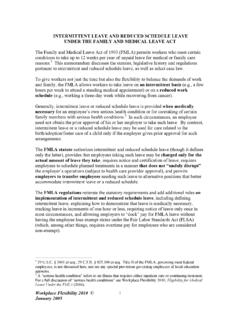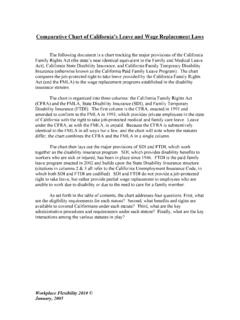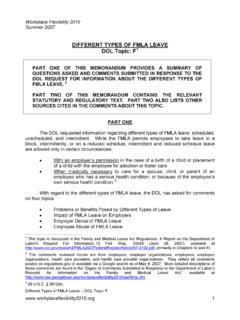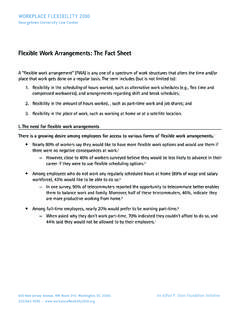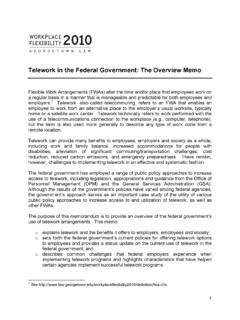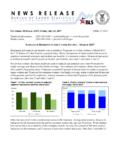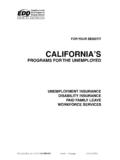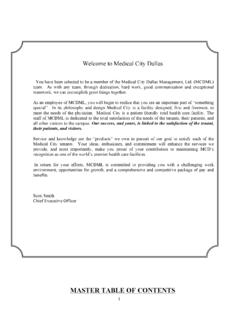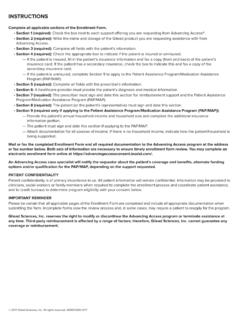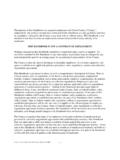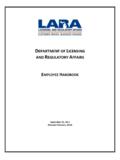Transcription of ELIGIBILITY FOR MEDICAL LEAVE UNDER THE …
1 ELIGIBILITY FOR MEDICAL LEAVE UNDER THE FMLA1 I. INTRODUCTION A. Personal MEDICAL LEAVE The family and MEDICAL LEAVE Act of 1993 (FMLA) permits eligible workers to take up to 12 weeks per year of unpaid LEAVE for MEDICAL reasons either their own or those of an immediate family In the case of personal MEDICAL LEAVE , an employee is entitled to LEAVE for MEDICAL conditions that constitute serious health conditions and that make an employee unable to perform the functions of his or her position. The FMLA statute defines serious health condition as: an illness, injury, impairment or physical or mental condition that involves inpatient care or continuing treatment by a health care provider.
2 The statute does not further define inpatient care or continuing treatment. Nor does the statute further define the phrase unable to perform the functions of the position. 3 B. MEDICAL LEAVE to Care for a family Member In the case of MEDICAL LEAVE taken to care for a family member, an employee is entitled to LEAVE to care for a spouse, son, daughter or parent with a serious health condition. The definition of serious health condition is the same: an illness, injury, impairment or physical or mental condition that involves inpatient care or continuing treatment by a health care provider. The statute requires no further limitation on the part of the family member that is, there is no equivalent requirement in the statute that the serious health condition causes the family member to be unable to work or to be unable to perform daily activities.
3 The legislative history of the FMLA explains that MEDICAL LEAVE is limited to serious health conditions that make an employee unable to work because short term conditions for which treatment and recovery are very brief were presumed to be covered UNDER even the most modest sick LEAVE policies. 4 In the committee reports accompanying the FMLA, the committees laid out a general test that [w]ith respect to an employee, the term serious health condition is intended to cover conditions or illnesses that affect an 1 In referring to MEDICAL LEAVE , this memorandum covers both LEAVE for an employee s own needs due to a qualifying MEDICAL condition and LEAVE to care for a family member with a qualifying MEDICAL condition.
4 While the latter type of LEAVE often is referred to as family LEAVE , this memorandum will consider both types as MEDICAL LEAVE , since both depend on the demonstrated existence of a qualifying serious health condition. 2 29 2612(a)(1). Title II of the FMLA, governing most federal employees, is not discussed here, nor are any special FMLA provisions governing employees of local education agencies. 3 29 2611(11). 4 REP. NO. 103-8, pt. I, at 40 (1993), at 40; S. REP. NO. 103-3, at 28 (1993). Two House committee reports accompanied the FMLA one by the Committee on Education and Labor dealing with Title I of the Act , and the other by the Committee on Post Office and Civil Service, dealing with Title II.
5 Because this memo focuses solely on Title I of the Act, all references to the House Committee Report refer to the report by the Committee on Education and Labor, unless otherwise noted. Workplace Flexibility 2010 January 2005 1employee s health to the extent that he or she must be absent from work on a recurring basis or for more than a few days for treatment or recovery. 5 The committee reports noted that the statutory definition of serious health condition requires either inpatient care or continuing treatment by a health care provider. As the reports explained, in any case where there is doubt whether coverage is provided by this act, the general test set forth in this paragraph shall be determinative.
6 With respect to MEDICAL LEAVE to care for a family member, the House report states that the term serious health condition is intended to cover conditions or illnesses that similarly affect the health of the spouse, son, daughter or parent such that he or she is unable to participate in school or in his or her regular daily The Senate report states that an employee may take LEAVE to care for a parent or spouse whose daily living activities are impaired by a serious health Thus, although the statute does not require a particular form of incapacity in the family member, the committee reports presume that the general test stated above will apply equally to personal MEDICAL LEAVE and MEDICAL LEAVE to care for a family member.
7 II. SOME LEGISLATIVE BACKGROUND From the time of its first introduction in April 1985, the FMLA covered only serious illnesses, injuries or conditions that made the employee unable to work because of the treatment for or effects of the condition. The first bill on job-protected family and MEDICAL LEAVE was introduced by Representative Patricia Schroeder (D-CO) in 1985 2020, the Parental and Temporary Disability Act. In that bill, MEDICAL LEAVE was described as temporary disability LEAVE for those serious conditions that were likely to require continuing MEDICAL treatment or confinement of one month or In 1986, companion FMLA bills were introduced in the House and the Senate: 4300, with Rep.
8 William Clay as the chief sponsor, and S. 2278, with Sen. Chris Dodd as the chief sponsor. In both of those bills, and in all subsequent versions of the bill, employees were given a right to unpaid MEDICAL LEAVE for serious health conditions, defined as conditions that involve inpatient care or continuing treatment or supervision by a health care In the version of the FMLA that was enacted, the phrase or supervision was dropped from the definition. Thus, MEDICAL LEAVE UNDER the FMLA is available for a health condition that involves continuing treatment by a health care provider. 5 REP.
9 NO. 103-8, pt. I, at 40 (1993). 6 Id. 7 S. REP. NO. 103-3, at 24 (1993). 8 2020, 99th Cong. 101(10), (14) (1985). See Workplace Flexibility 2010, ELIGIBILITY for MEDICAL & family LEAVE UNDER the FMLA: Development of the Statutory Text 1985-1993 (2004) (chart detailing ELIGIBILITY for MEDICAL LEAVE language in every FMLA introduced in Congress.) (hereinafter Statutory Text Development Chart ). Workplace Flexibility 2010 January 2005 2 Committee reports accompanying the version of the FMLA enacted in 1993 indicate that the definition serious health condition was intentionally expansive. Both the House and Senate reports note that the definition is broad and intended to cover various types of physical and mental conditions that meet the general test that either the underlying health condition or the treatment for it requires that the employee be absent from work on a recurring basis or for more than a few days for treatment or recovery.
10 10 In addition, the committee reports indicated that the definition permits intermittent LEAVE for necessary doctor s The committee reports provide a nonexhaustive list of various serious health conditions. These included, for example, heart attacks, cancers and respiratory ailments. But the reports emphasize that serious health conditions are not limited to those The reports also explained that all of the enumerated conditions meet the general test, , that the condition or its treatment requires recurring or extended absence from work, and the statutory test, , that the condition involves either inpatient care or continuing treatment [] by a health care provider, and frequently involves both.
